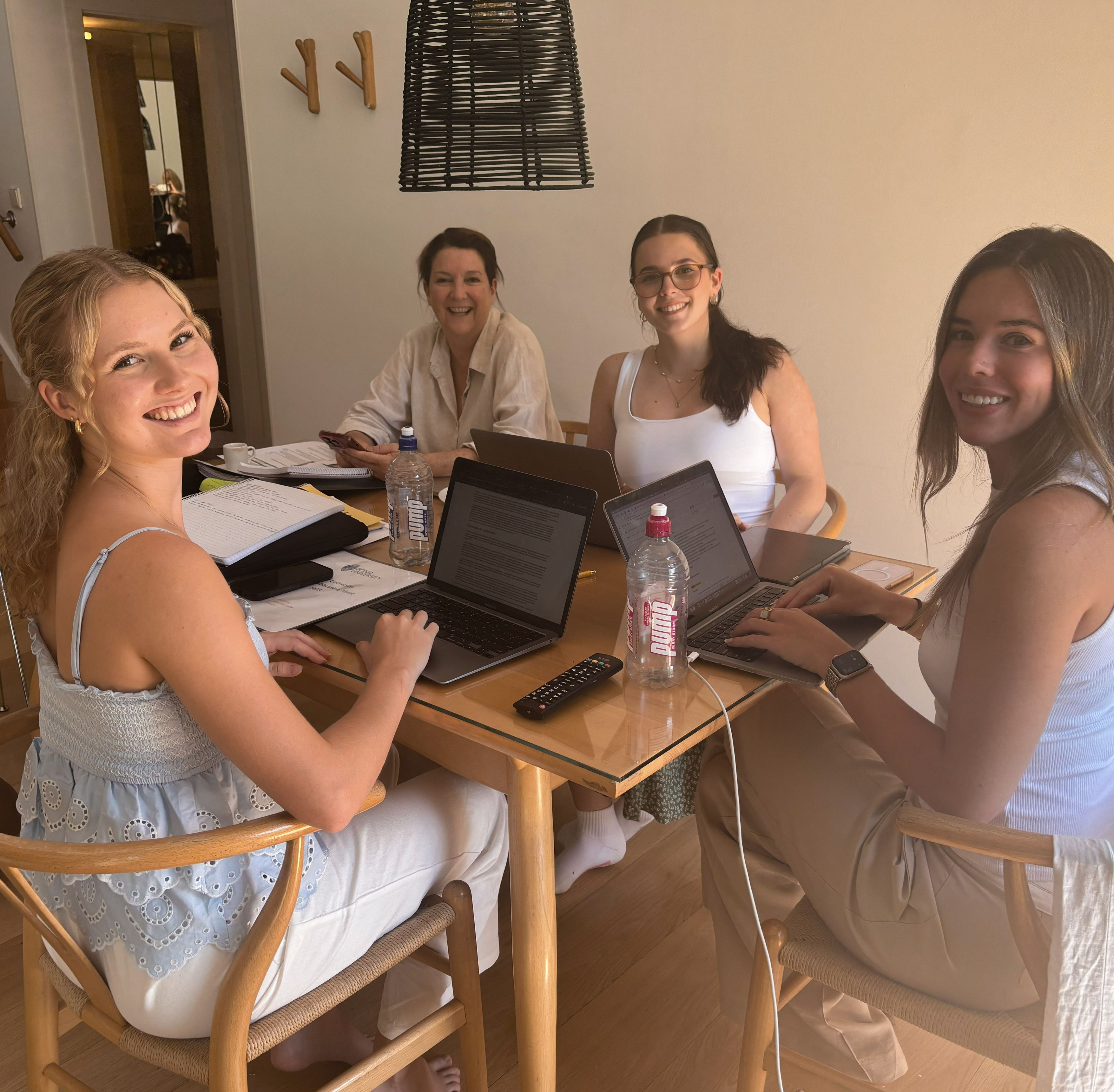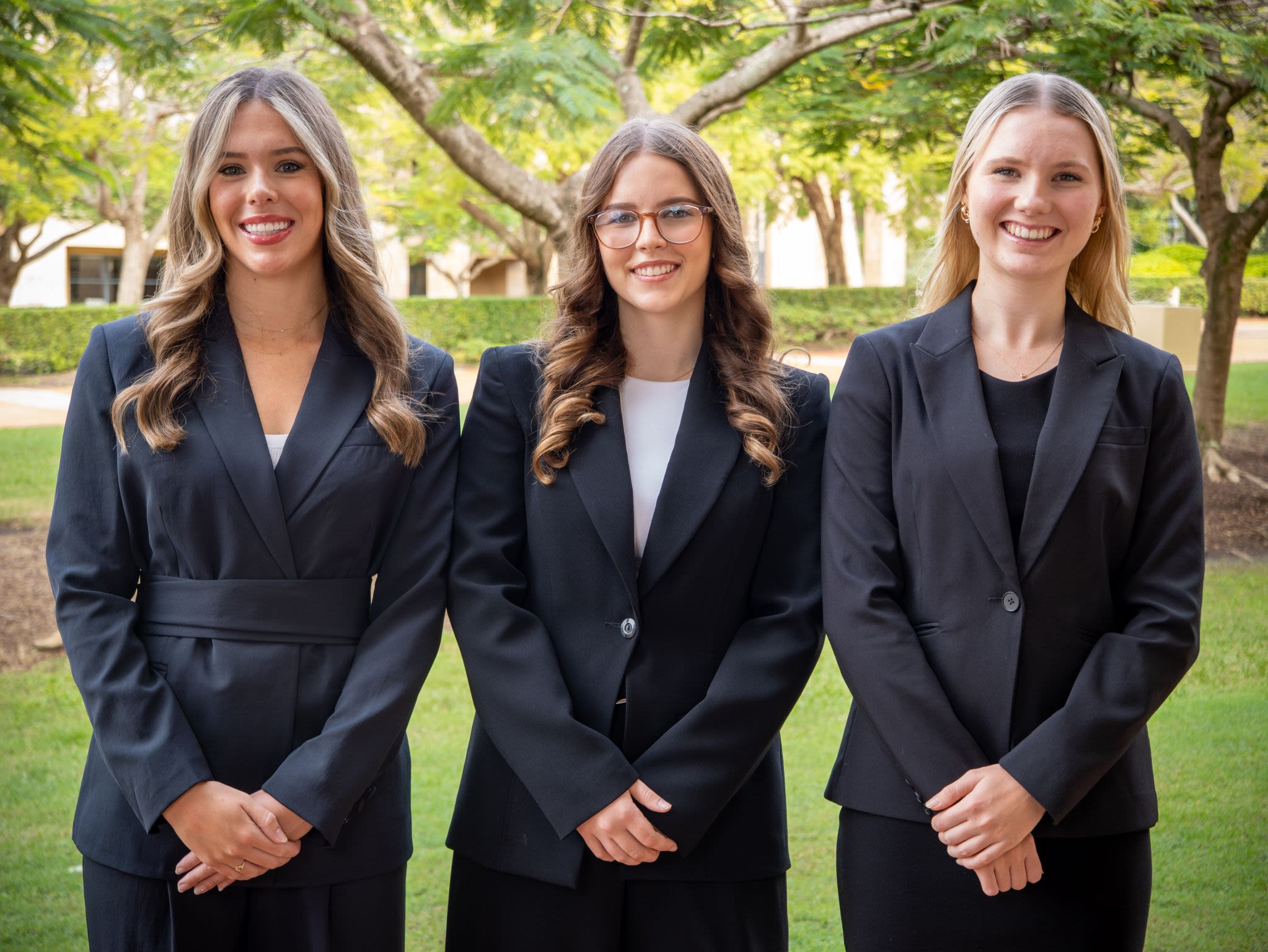

Stephanie Wilks shuffles the legal documents before her at a conference table at Santoña Palace, the headquarters of the Madrid Court of Arbitration in Spain. She’s set to argue an appeal of an Olympics disqualification. She has spent six months preparing, alongside fellow speaker Rebecca Webb and instructing solicitor Charlotte Hughes, and feels quietly confident. The composure of the trio and the conviction with which they speak would lead you to believe they are highly qualified — but they’re not yet lawyers. This is what mooting looks like as a Bond University student.
Bond University’s win at the 2025 Sports Arbitration Moot (SAM) brought a moment of reflection for Stephanie. It came just two years after she first set foot in Bond’s Moot Court as a Year 12 student. Back then, Stephanie felt as though she was speaking “a thousand miles an hour” contesting the semi-finals of the 2023 Bond University National High School Mooting Competition.
“I was standing before the judges, who seemed scary, and now I’ve come to know them as my professors and mentors,” Stephanie says.
“As a high school student, I had little knowledge of the law I was arguing, and I wasn’t confident in my advocacy, but I enjoyed answering the judges’ questions and thinking on my feet.
“I wanted to do as many moots as possible after that experience.”
What is mooting? Mooting is a simulated court proceeding where student teams are presented with a legal problem which they are required to argue before a panel of judges. Through their preparation and presentation, students must show an understanding of the relevant law and how it applies in their hypothetical client’s case. Moots often involve a written component where competitors are required to prepare and submit an outline of their case, called a memorial, prior to arguing it verbally. The research and writing involved in preparing the written memorial are a crucial element of success in mooting competitions. Mooting competitions generally focus on a specific area of law such as sports arbitration, criminal law, or humanitarian law. |
|---|
Stephanie applied for Bond’s international mooting team when she began at the University the following year. She was excited to draw on her passion for sport when she was placed in the SAM team. She felt equally determined as her teammates — classmate Rebecca and final year student Charlotte Hughes, who brought a wealth of experience and led the research component. The team received their brief for the May 2025 moot in November 2024 and got to work immediately.
The trio’s win ultimately came down to their ability to confidently answer questions from the panellists, which Stephanie says was a credit to Bond’s Faculty of Law.
“Before we left, we had practices with about 20 faculty members from a range of practice areas who provided new perspectives and questions,” she says.
“We knew our scenario like the back of our hands, and it set us apart; other teams, who knew their cases well, fumbled when they were taken off track.
“The grand final was a proud moment, sitting at a huge table in a palace with 200 people watching in person and more through a livestream.”
Their audience included representatives from Fédération Internationale de Football Association (FIFA), the International Paralympic Committee and Union of European Football Associations.

A gold medal performance
“You saw the future attorneys you may want to hire to run your CAS [Court of Arbitration for Sport] cases,” CAS Arbitrator Annett Rombach said as she announced the winners of the 2025 SAM.
The gold-medal winning team was coached by Bond University Faculty of Law Associate Professor, Dr Annette Greenhow, who described the moot as a “spectacular, polished, elite-level performance”.
“If you've managed to watch the finals, you'll witness firsthand not only the stellar advocacy of Rebecca and Steph, supported by Charlotte's 250-page summaries of almost the entire CAS body of jurisprudence — one for the records — but also the collective efforts of the entire Bond Law support team,” Associate Professor Greenhow said.

‘Part of our DNA’
Bond University has qualified for the international finals of the SAM every year it has entered. The most recent win adds to dozens of mooting accolades the University has collected across various areas of law in Australia, China, the United States of America and Spain.
Director of Competitive Mooting Assistant Professor Lisa Bonin says mooting is one of the best experiential learning environments because it challenges students to master a broad spectrum of skills by actively doing.
“It gives me immense gratification to watch students grow from nervous, self-conscious, sometimes awkward speakers into confident, articulate, and professional advocates,” she says.
“I see students who start from a place of no knowledge in a particular area of law develop into experts in the subject matter, who relish the intellectual exercise of sparring with judicial, professional, and academic experts in the field, and to do so with confidence and alacrity.”
Assistant Professor Bonin says the tight-knit Bond mooting community is what gives the University’s ambitious teams their winning edge.
“Mooting is part of our DNA,” she says.
“Students are encouraged to engage with mooting from their first week of law school.
“The faculty and law student associations work to provide a consciously supportive environment for the development of mooting skills.”
Room to moot
Every Bond University law student has the opportunity to moot throughout their program regardless of whether they participate in extracurricular mooting competitions. Executive Dean of the Faculty of Law, Professor Nick James, says one of the benefits of Bond’s small class sizes is the faculty can use mooting as an assessment tool in many subjects.
“It isn’t feasible at many other law schools where there are large numbers of students enrolled in each subject,” Professor James says.
“At Bond, we can assess our students by having them engage in mooting to demonstrate their understanding of the material and their advocacy skills.”
He says mooting is a powerful and impactful learning experience for law students.
“Mooting is stressful and exhausting but there is no better way for a student to bed down their understanding of the law and develop extraordinary thinking, communication, and resilience skills,” Professor James says.
“Our students often tell us mooting is one of the highlights of their law school experience.”


Room to moot
Every Bond University law student has the opportunity to moot throughout their program regardless of whether they participate in extracurricular mooting competitions. Executive Dean of the Faculty of Law, Professor Nick James, says one of the benefits of Bond’s small class sizes is the faculty can use mooting as an assessment tool in many subjects.
“It isn’t feasible at many other law schools where there are large numbers of students enrolled in each subject,” Professor James says.
“At Bond, we can assess our students by having them engage in mooting to demonstrate their understanding of the material and their advocacy skills.”
He says mooting is a powerful and impactful learning experience for law students.
“Mooting is stressful and exhausting but there is no better way for a student to bed down their understanding of the law and develop extraordinary thinking, communication, and resilience skills,” Professor James says.
“Our students often tell us mooting is one of the highlights of their law school experience.”
That rings true for Stephanie who says mooting has fuelled her career ambitions to become a barrister.
“Obviously mooting is the best thing you can do for that because it's practising your career at the end of the day,” she says.
“Even if becoming a barrister isn't the end goal, mooting increases your confidence because you have to speak with conviction in a room full of people who have a lot more knowledge and experience than you do.
“That’s a big part of going into the legal profession.”
Published on Wednesday, 16 July, 2025.
That rings true for Stephanie who says mooting has fuelled her career ambitions to become a barrister.
“Obviously mooting is the best thing you can do for that because it's practising your career at the end of the day,” she says.
“Even if becoming a barrister isn't the end goal, mooting increases your confidence because you have to speak with conviction in a room full of people who have a lot more knowledge and experience than you do.
“That’s a big part of going into the legal profession.”
Published on Wednesday, 16 July, 2025.
Original thinking direct to your inbox

Stories from Bond



